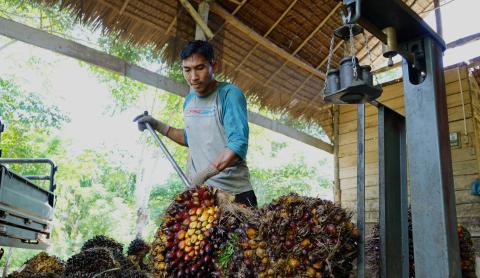SBP verification can now show compliance with EU RED II
Preferred by Nature has completed its first SBP verification that is in conformity with the European Union Renewable Energy Directive II (EU RED II). Our recent audit, carried out on Holzkontor und Pelletierwerk Schwedt GmbH (HPS) operations, has shown the Sustainable Biomass Program (SBP) scheme’s readiness to provide verification in compliance with EU RED II.
According to Ondřej Tarabus, Climate Programme Director at Preferred by Nature, who was involved in the verification process, the system applied is efficient and proved to be a good tool for evaluating compliance.
“The SBP RED II module can be used to verify that feedstocks used for biomass production are in compliance with RED II within just one audit. It proved very effective though it’s still a rigorous system,” explained Ondrej.
By 2050, Europe wants to be the first continent in the world to be climate neutral. Between 2004 and 2019, the use of renewable energy more than doubled, and demand is still rising. However, as the use of biofuels increases, businesses come under increased scrutiny to adhere to sustainability regulations like EU RED II.
Holzkontor und Pelletierwerk Schwedt GmbH (HPS) was founded in 2006 as a pure industrial pellet factory. Today, being a part of LEAG (the largest power plant operator in eastern Germany and the German division of the Czech energy company EPH), HPS manufactures premium and industrial wood pellets and distributes them to all kinds of end-users, from residents to large power plants. HPS has a production capacity of 120 thousand tons of pellets a year.
“We want to run our business in a sustainable way, not only because the legislation requires us to do so. Companies need to be fully aware of their role in the transition economy because sustainability has grown to be one of the most important factors in consumer decision-making,” said Sylwia Senczyszyn, HPS CEO.
“We wish to contribute to the achievement of the targets for renewable energy and participate in the clean energy transformation,” she added.
Sustainability requires more efficient and economical use of local resources and energy. HPS has committed to continually improving its energy efficiency, as shown by its ISO 50001 certificate, and has set its procedures to only source sustainable and undisputed raw materials, as by its PEFC and SBP certificates.
The Renewable Energy Directive (RED) of the European Union went into effect in 2009. It established sustainability criteria for biofuels and biomass fuels, including renewable fuels of non-biological origin and recycled carbon fuels.
EU RED II came into force on 1 July 2021. It added extra requirements, such as sustainability for forestry feedstocks and greenhouse gas (GHG) emissions for solid and gaseous biomass fuels. It also defined a series of sustainability and GHG emission criteria for bioliquids used in transport. To assist businesses in ensuring complete compliance, several voluntary programmes have been introduced.
“The RED II impacts a number of companies. We were pleased to be part of this journey and partner with HPS in our first evaluation of SBP-certified operations using the REDII compliance module,” said Ondřej.
“HPS not only wants to protect nature by selling an organic product but also applies environmentally friendly and efficient production procedures in their operations. We hope to cooperate with more businesses like that, that contribute to environmental protection and achieving the ambitious EU’s goals,” he added.
Rens Hartkamp of BiomassConsult added: “HPS obtained SBP over three years ago and has been implementing the system dedicatedly. The company knows precisely from where it sources its feedstock. Now it is the first to achieve the RED II add-on within SBP. The introduction of the module required additional procedures and a new kind of mass-balance accounting system. Beneficial to the project was the fact that for Germany, an approved RED II ‘Level A’ risk assessment had already been available.”
The Sustainable Biomass Program (SBP), an initiative set up by seven major European energy producers that use biomass in their power plants, is a unique certification system designed for woody biomass used in industrial, large-scale energy production. Through the SBP certification system, the scheme aims to support responsible solid biomass supply chains that contribute to a low-carbon economy.
SBP allows companies to demonstrate their compliance with legal, regulatory and sustainability requirements on solid biomass. With SBP, biomass producers and traders can prove compliance with the stimulation programmes of the leading countries in industrial biomass. In September 2022, SBP was officially recognised by the European Commission as a voluntary certification scheme under RED II. Click HERE to learn more.



